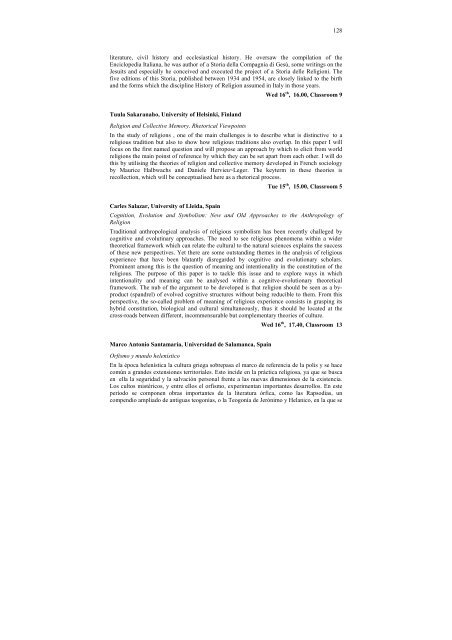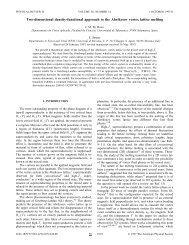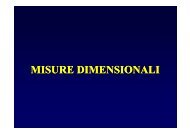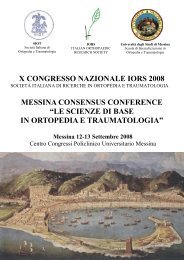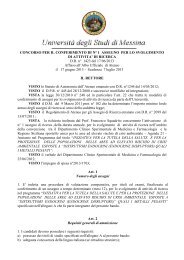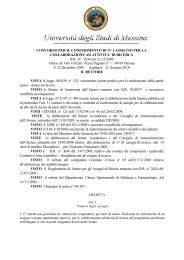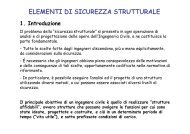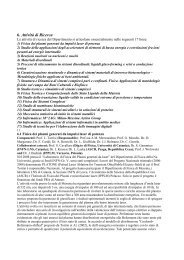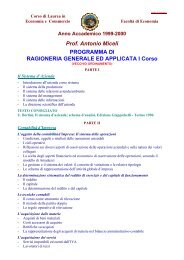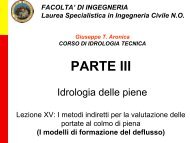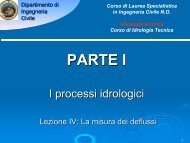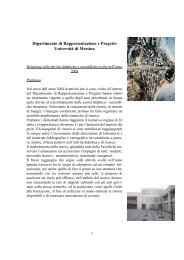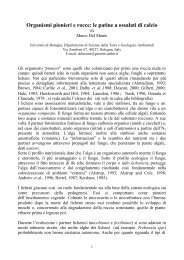PROGRAMME AND ABSTRACTS - Università degli Studi di Messina
PROGRAMME AND ABSTRACTS - Università degli Studi di Messina
PROGRAMME AND ABSTRACTS - Università degli Studi di Messina
You also want an ePaper? Increase the reach of your titles
YUMPU automatically turns print PDFs into web optimized ePapers that Google loves.
128<br />
literature, civil history and ecclesiastical history. He oversaw the compilation of the<br />
Enciclope<strong>di</strong>a Italiana, he was author of a Storia della Compagnia <strong>di</strong> Gesù, some writings on the<br />
Jesuits and especially he conceived and executed the project of a Storia delle Religioni. The<br />
five e<strong>di</strong>tions of this Storia, published between 1934 and 1954, are closely linked to the birth<br />
and the forms which the <strong>di</strong>scipline History of Religion assumed in Italy in those years.<br />
Tuula Sakaranaho, University of Helsinki, Finland<br />
Religion and Collective Memory. Rhetorical Viewpoints<br />
Wed 16 th , 16.00, Classroom 9<br />
In the study of religions , one of the main challenges is to describe what is <strong>di</strong>stinctive to a<br />
religious tra<strong>di</strong>tion but also to show how religious tra<strong>di</strong>tions also overlap. In this paper I will<br />
focus on the first named question and will propose an approach by which to elicit from world<br />
religions the main poinst of reference by which they can be set apart from each other. I will do<br />
this by utilising the theories of religion and collective memory developed in French sociology<br />
by Maurice Halbwachs and Daniele Hervieu~Leger. The keyterm in these theories is<br />
recollection, which will be conceptualised here as a rhetorical process.<br />
Carles Salazar, University of Lleida, Spain<br />
Tue 15 th , 15.00, Classroom 5<br />
Cognition, Evolution and Symbolism: New and Old Approaches to the Anthropology of<br />
Religion<br />
Tra<strong>di</strong>tional anthropological analysis of religious symbolism has been recently challeged by<br />
cognitive and evolutinary approaches. The need to see religious phenomena within a wider<br />
theoretical framework which can relate the cultural to the natural sciences explains the success<br />
of these new perspectives. Yet there are some outstan<strong>di</strong>ng themes in the analysis of religious<br />
experience that have been blatantly <strong>di</strong>sregarded by cognitive and evolutionary scholars.<br />
Prominent among this is the question of meaning and intentionality in the constitution of the<br />
religious. The purpose of this paper is to tackle this issue and to explore ways in which<br />
intentionality and meaning can be analysed within a cognitve-evolutionary theoretical<br />
framework. The nub of the argument to be developed is that religion should be seen as a byproduct<br />
(spandrel) of evolved cognitive structures without being reducible to them. From this<br />
perspective, the so-called problem of meaning of religious experience consists in grasping its<br />
hybrid constitution, biological and cultural simultaneously, thus it should be located at the<br />
cross-roads between <strong>di</strong>fferent, incommensurable but complementary theories of culture.<br />
Marco Antonio Santamaría, Universidad de Salamanca, Spain<br />
Orfismo y mundo helenístico<br />
Wed 16 th , 17.40, Classroom 13<br />
En la época helenística la cultura griega sobrepasa el marco de referencia de la polis y se hace<br />
común a grandes extensiones territoriales. Esto incide en la práctica religiosa, ya que se busca<br />
en ella la seguridad y la salvación personal frente a las nuevas <strong>di</strong>mensiones de la existencia.<br />
Los cultos mistéricos, y entre ellos el orfismo, experimentan importantes desarrollos. En este<br />
período se componen obras importantes de la literatura órfica, como las Rapso<strong>di</strong>as, un<br />
compen<strong>di</strong>o ampliado de antiguas teogonías, o la Teogonía de Jerónimo y Helanico, en la que se


